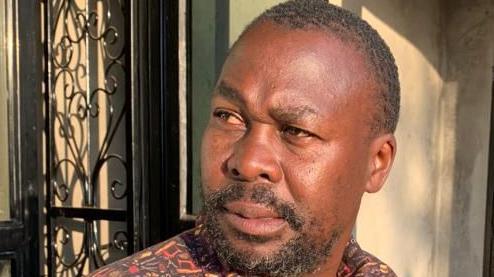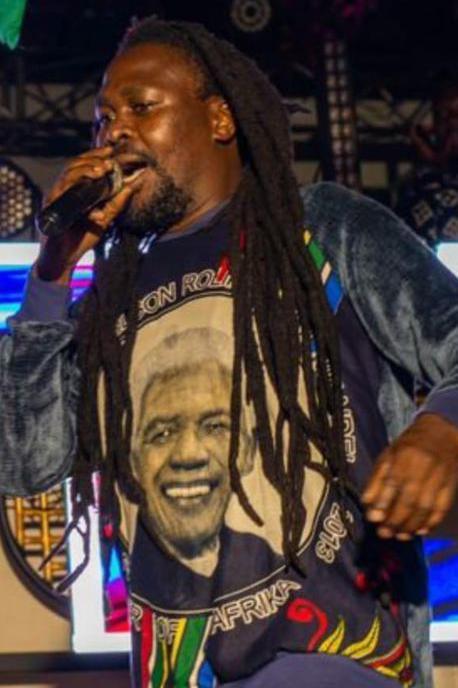Top designer vows to regrow dreadlocks cut after Uganda arrest

Latif Madoi says this is the first time his daughter has seen him without dreadlocks
- Published
A prominent Ugandan fashion designer whose dreadlocks were cut off after he was arrested has told the BBC he plans to grow them back "for as long as [he] lives".
Latif Madoi, who has made clothes for celebrities like late South African reggae icon Lucky Dube and Jamaica's Busy Signal, spent just over six weeks in detention.
He has not been convicted of any crime but the prison authorities nevertheless insisted on cutting the dreadlocks he had been growing for 17 years.
On Monday he was released on bail for one million Ugandan shillings (£213; $269).
After settling in back home, Mr Madoi told the BBC that losing his beloved locs had left him "heart-broken".
He said he had pleaded with the prison officer in charge to be allowed to keep them and "shed a tear" when they were cut.
"I consider my dreadlocks as my crown," he said, adding that he was well known for having them and now he just looked like everyone else.
Despite losing such a big part of his identity, he said "it doesn't change the heart".
The 47-year-old was known for performing "fashion concerts" where he would make 10 to 15 dresses in just two hours.
But now, without the dreadlocks, he feels "shy... like I can't visit places. Maybe I'll even feel shy coming back on stage".
Police said they raided his fashion school and arrested him for possessing "uniforms declared to be for the exclusive use" of the military and police, which is illegal under Ugandan law.
But Mr Madoi, his lawyer and numerous Ugandan supporters online are convinced he was locked up for his affiliation with Bobi Wine, the opposition leader and singer whose real name is Robert Kyagulanyi Ssentamu.

Mr Madoi had been growing his dreadlocks for 17 years
The pair met when Bobi Wine asked Mr Madoi to make him some clothes for his concerts and music videos. Their relationship continued when Bobi Wine entered politics - the opposition leader's signature campaigning outfit, a pair of bright red overalls, were designed by Mr Madoi.
Mr Madoi accepts that he was in possession of military gear when police raided his school on 13 May - but that that uniform was from the US army.
He tells the BBC he was making alterations for his friend who is a serving marine in the United States.
Despite having this uniform, Mr Madoi says he is certain the police arrested him because he made Bobi Wine's red overall.
"There's no other reason. Everyone who is affiliated with Bobi Wine will always be arrested," he says.
"We know we are not free any more. I cannot visit him at his home any time I want, like I used to. You always fear that maybe you will get arrested."
The BBC has approached the Ugandan authorities for comment.
The country's security forces have a long history of pursuing President Yoweri Museveni's political opponents.
Bobi Wine, currently the president's biggest rival, has been arrested numerous times and faced several charges, including treason, all of which he denies.
The authorities deny the arrests have been political and say they have been necessary to maintain law and order during opposition protests.

Bobi Wine's red beret and overalls have become part of his signature style
On Monday, Bobi Wine announced Mr Madoi's release to his two million followers on social media platform X, formerly Twitter.
"Welcome back from captivity my brother Latif Madoi," the message read.
"It's a shame what loss, indignity and humiliation the regime has subjected you to since it detained you six weeks ago for having offered us your professional services."
Mr Madoi is due back in court on 29 July. Between now and then, he will be trying to replace his school's sewing machines, which were seized in the raid.
"The business is not the same... students have no machines where they can learn from, where we can make demonstrations from," he says.
Mr Madoi is also working on feeling confident without his dreadlocks and has already managed to identify an upside.
"I have a 14-year-old daughter... she has never seen me without [dreadlocks]. Maybe she was always thinking: 'My dad was born like that,'" he laughs.
"That's comforted me - now she has the chance to see me without hair, looking like any other person."
In 2017 the BBC filmed Madoi making a single dress in four minutes
More BBC stories on Uganda:

Go to BBCAfrica.com, external for more news from the African continent.
Follow us on Twitter @BBCAfrica, external, on Facebook at BBC Africa, external or on Instagram at bbcafrica, external